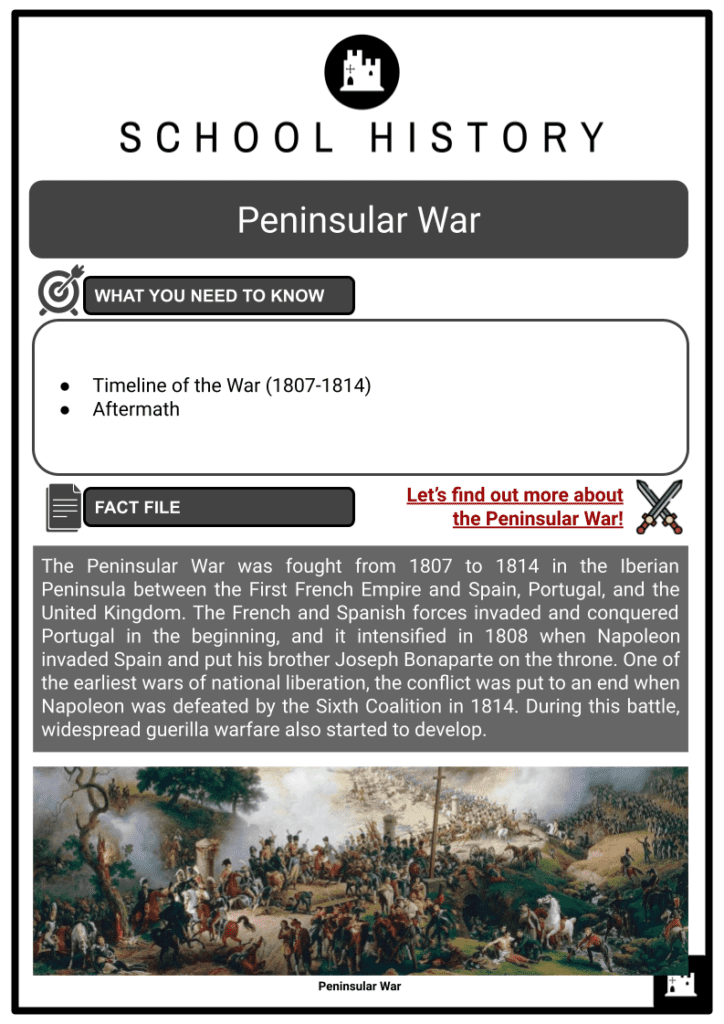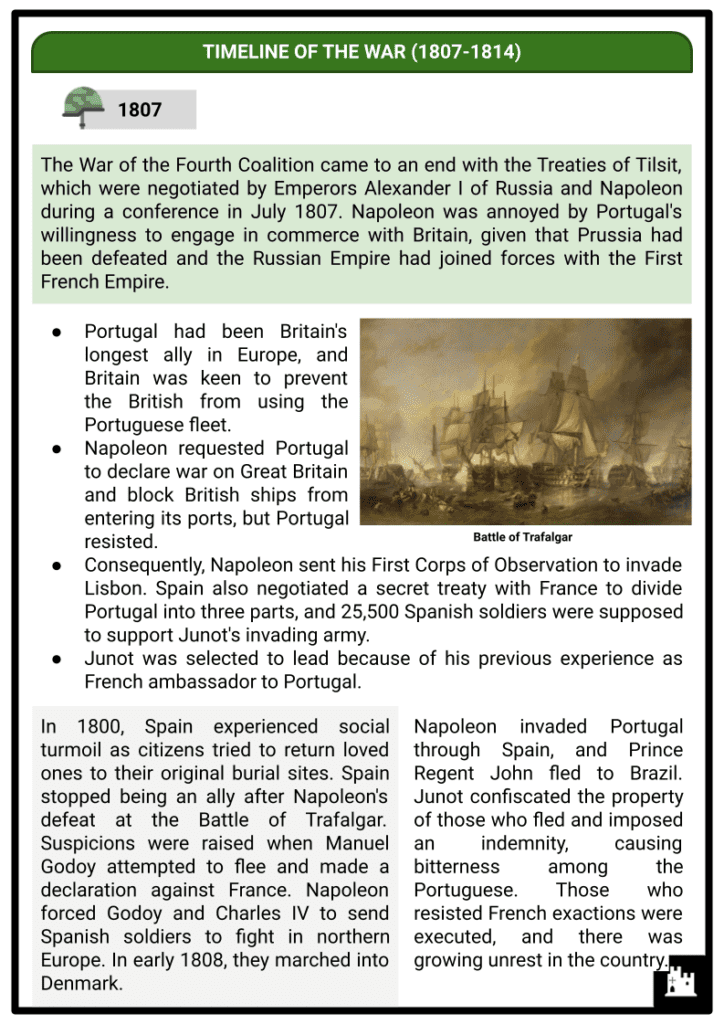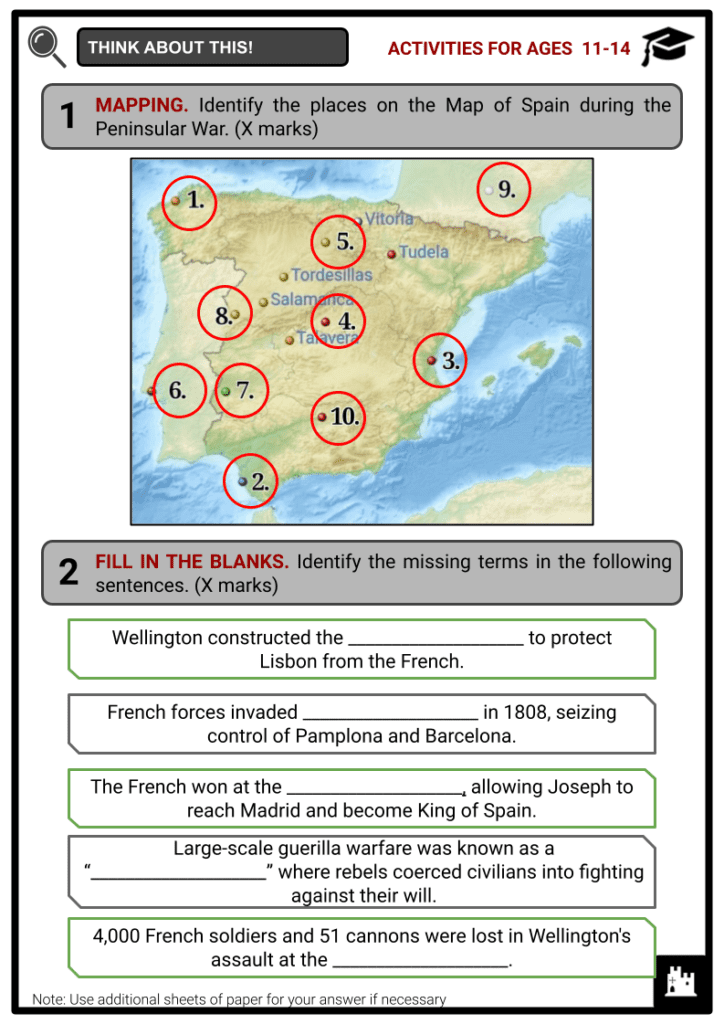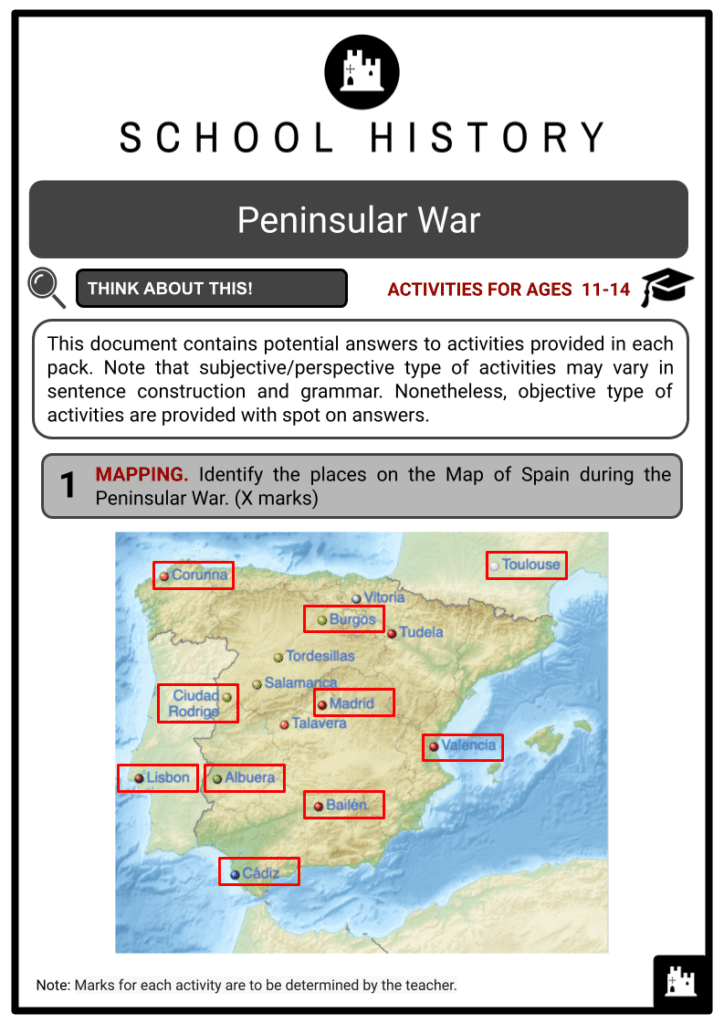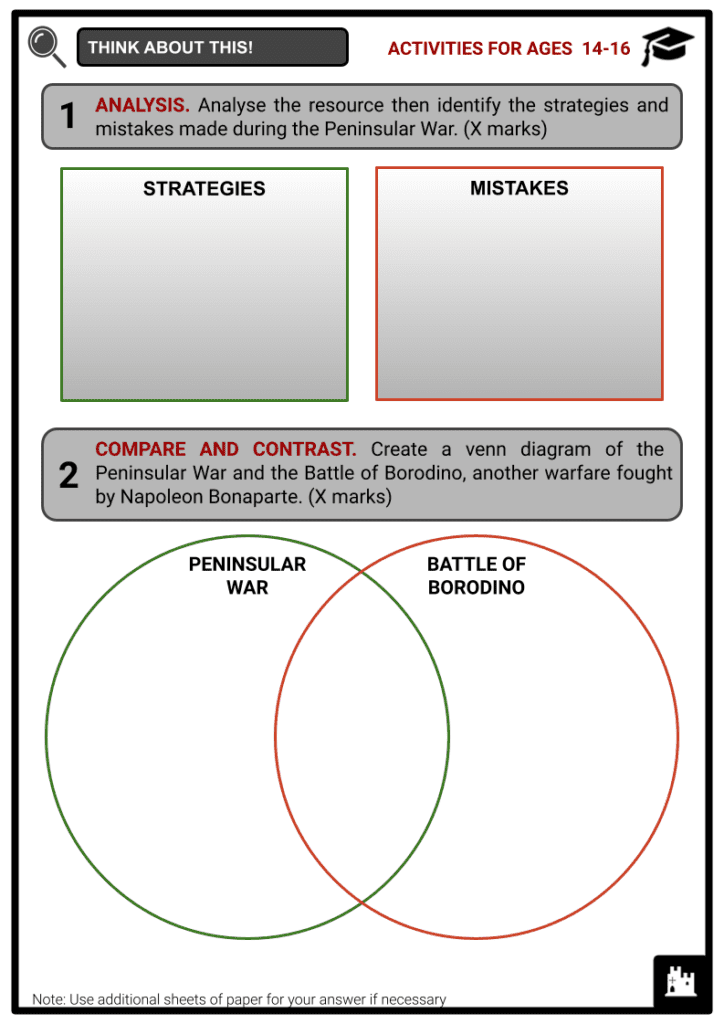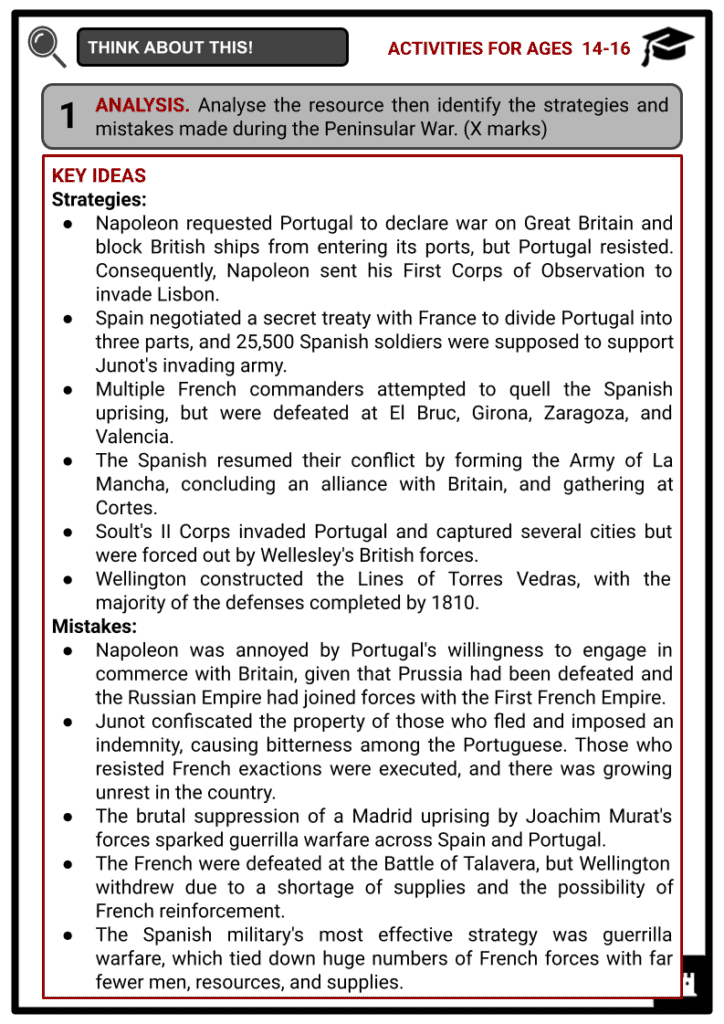Peninsular War Worksheets
Do you want to save dozens of hours in time? Get your evenings and weekends back? Be able to teach about the Peninsular War to your students?
Our worksheet bundle includes a fact file and printable worksheets and student activities. Perfect for both the classroom and homeschooling!
Summary
- Timeline of the War (1807-1814)
- Aftermath
Key Facts And Information
Let’s find out more about the Peninsular War!
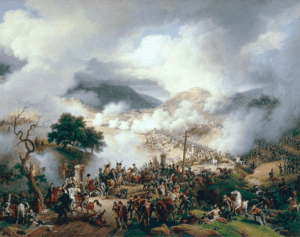
The Peninsular War was fought from 1807 to 1814 in the Iberian Peninsula between the First French Empire and Spain, Portugal, and the United Kingdom. The French and Spanish forces invaded and conquered Portugal in the beginning, and it intensified in 1808 when Napoleon invaded Spain and put his brother Joseph Bonaparte on the throne. One of the earliest wars of national liberation, the conflict was put to an end when Napoleon was defeated by the Sixth Coalition in 1814. During this battle, widespread guerilla warfare also started to develop.
TIMELINE OF THE WAR (1807-1814)
1807
- The War of the Fourth Coalition came to an end with the Treaties of Tilsit, which were negotiated by Emperors Alexander I of Russia and Napoleon during a conference in July 1807. Napoleon was annoyed by Portugal's willingness to engage in commerce with Britain, given that Prussia had been defeated and the Russian Empire had joined forces with the First French Empire.
- Portugal had been Britain's longest ally in Europe, and Britain was keen to prevent the British from using the Portuguese fleet.
- Napoleon requested Portugal to declare war on Great Britain and block British ships from entering its ports, but Portugal resisted.
- Consequently, Napoleon sent his First Corps of Observation to invade Lisbon. Spain also negotiated a secret treaty with France to divide Portugal into three parts, and 25,500 Spanish soldiers were supposed to support Junot's invading army.
- Junot was selected to lead because of his previous experience as French ambassador to Portugal.
- In 1800, Spain experienced social turmoil as citizens tried to return loved ones to their original burial sites. Spain stopped being an ally after Napoleon's defeat at the Battle of Trafalgar. Suspicions were raised when Manuel Godoy attempted to flee and made a declaration against France. Napoleon forced Godoy and Charles IV to send Spanish soldiers to fight in northern Europe. In early 1808, they marched into Denmark.
- Napoleon invaded Portugal through Spain, and Prince Regent John fled to Brazil. Junot confiscated the property of those who fled and imposed an indemnity, causing bitterness among the Portuguese. Those who resisted French exactions were executed, and there was growing unrest in the country.
1808
- In 1808, French troops invaded Navarre and Catalonia, taking control of Pamplona and Barcelona. The Spanish resistance was inconsistent, and Napoleon declared the Treaty of Fontainebleau void. The brutal suppression of a Madrid uprising by Joachim Murat's forces sparked guerrilla warfare across Spain and Portugal. By the end of May, all Spanish provinces rebelled, and France dispatched over 65,000 troops to control the situation. The main French army held a narrow strip of central Spain, while French columns searched for insurgent forces.
- Multiple French commanders attempted to quell the Spanish uprising, but were defeated at El Bruc, Girona, Zaragoza, and Valencia.
- At the Battle of Medina de Rioseco, the French emerged victorious, allowing Joseph to reach Madrid and become King of Spain.
- However, the capture of French ships at Cádiz and Dupont's defeat and surrender at Bailén resulted in more French casualties.
- As a result of this setback, Napoleon's military presence in Spain came to an end, with Joseph evacuating the capital and French troops withdrawing behind the Ebro.
- The setback also led to the rise of the Fifth Coalition, with other European countries spurred to oppose Napoleon.
1809
- During the Grande Armée's second siege of Zaragoza in 1808-1809, out of 44,000 troops, only 8,000 survived. The Spanish resumed their conflict by forming the Army of La Mancha, concluding an alliance with Britain, and gathering at Cortes. King Joseph entered Madrid joyously after routing the Spanish Army of the Center at Uclés.
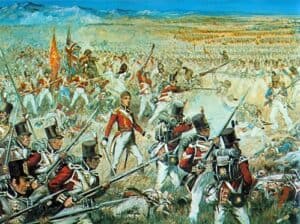
Battle of Talavera - The French won at Ciudad Real and Medellín but were unsuccessful in Vigo. Saint-Cyr was relieved of his command after defeating Reding at Valls in Catalonia and starting the third siege of Girona. After suffering retaliatory losses at Mara and Belchite, Suchet's III Corps was decimated, and Ney's army was routed at Puente Sanpayo near Pontevedra.
- In March, Soult's II Corps invaded Portugal and captured several cities but were forced out by Wellesley's British forces.
- The French were defeated at the Battle of Talavera, but Wellington withdrew due to a shortage of supplies and the possibility of French reinforcement. In the summer of 1809, the Spanish established the Cortes of Cádiz with over 100,000 soldiers to retake Madrid.
- Del Parque took Salamanca, but eventually, he was defeated at Alba de Tormes.
- By mid-January, Del Parque's force had dwindled and fled into the highlands.
1810
- King Joseph appointed royal commissioners to manage local administration under French occupation, and Spain was divided into 38 new provinces, which were later transformed into prefectures in the French style by April 1810. While many Spaniards opposed the French invasion due to the bloodshed and cruelty it brought, some embraced French Revolution and Enlightenment principles. Contrary to some Marxist claims, it's likely that participation in the Napoleonic revolution was motivated more by necessity than philosophy.
- The Peninsular War was a "people's war" that witnessed large-scale guerrilla warfare, with insurgents forcing citizens to join against their will. The Spanish military's most effective strategy was guerrilla warfare, which tied down huge numbers of French forces with far fewer men, resources, and supplies.
- The war efforts of Austria, Russia, and Prussia against Napoleon were driven by the widespread opposition of the Spanish people. There was establishment of a five-member Regency Council of Spain and the Indies and the Cortes formed a permanent government under the 1812 Constitution, granting voting rights to all male householders over the age of 25. Quito and Charcas experienced unrest, as they considered themselves to be the capitals of kingdoms and did not like being absorbed into the greater "kingdom" of Peru.
- To protect Lisbon from the French, Wellington constructed the Lines of Torres Vedras, with the majority of the defences completed by 1810.
- 200,000 people moved inside when the lands in front of the lines were burned.
- Marshal Masséna's French army invaded Portugal, forcing Wellington to retreat to Busaco.
- Masséna concentrated near Sobral for an assault after failing to dislodge the Anglo-Portuguese force from its position, but after a fierce battle, he entrenched himself.
- Due to a lack of supplies, Masséna's army was compelled to retreat and take up a position between Santarém and Rio Maior.
1811
- In 1811, French forces were weakened after sending reinforcements to support a siege, and the Allies defeated them at Barrosa but failed to capitalise on their victory. Soult captured Badajoz and Olivenza before returning to Andalusia. In March, Masséna withdrew from Portugal, and Wellington attacked, forcing Soult to withdraw his army to Seville. Both sides claimed victory at Fuentes de Ooro, and Marmont took over from Masséna. The Anglo-Spanish garrison at Tarifa was not destroyed by the French.
- The Spanish captured Figueres with the aid of 2,000 soldiers, while the French Army of Aragon took Tortosa in Catalonia. Before forcing the Spanish out of Montserrat, the French blockaded and seized Tarragona, massacring 2,000 inhabitants there. The French besieged Sagunto in Valencia, foiled Blake's rescue mission, and compelled Valencia to submit, taking Dénia with them. Napoleon elevated Suchet to the rank of Duke of Albufera, but the French were unable to gain an advantage, and over 200,000 of their men were sent to guard their supply routes as the conflict dragged on.
1812
- At the outset of 1812, Wellington launched a brutal siege on Ciudad Rodrigo and subsequently on Badajoz. These victories established Wellington as an aggressive commander. On 17 June they captured Salamanca and routed the French at the Battle of Salamanca on 22 July. As the Anglo-Portuguese troops advanced towards Madrid, which surrendered on 14 August, the French reorganised.
- After the allied victory at Salamanca in 1812, the French were forced to abandon Madrid and retreat to Valencia. Moreover, the French were obliged to lift the two and a half-year-long siege of Cadiz.
- Following a French counteroffensive, the allies marched towards Burgos, but Wellington was unable to capture it and decided to retreat to Portugal. This twofold withdrawal resulted in heavy losses for the allies, while the French were compelled to abandon Andalusia and Asturias.
1813
- The victory of the Russians over the French army led to the withdrawal of French forces from Spain. Despite their control over a large part of the region, the French presence was still small and vulnerable to attack. At the Battle of Vitoria in 1813, Wellington led a march of 121,000 soldiers to victory against Joseph Bonaparte's army. Although the French were forced to retreat, the battle was far from over as more French forces were gathering beyond the Pyrenees. The victory increased British influence on the continent, but the prospect of Napoleon's return with the Grande Armée was unsettling.
- In August 1813, the British headquarters were uncertain about the invasion of France by the eastern forces. The Allies suffered a setback at the Battle of Dresden, and the situation was still precarious. Wellington's reliance on Spanish support was also unclear, and desertions had become a problem as the army prepared to defend France's frontiers. Marshal Soult launched a counteroffensive but was repulsed at the Battle of Sorauren. Wellington took the French city of San Sebastián and attacked the French position on 7 October, forcing Soult to retreat.
- Marshal Suchet led the French Catalan army in battles against Elio's Murcians and British Lieutenant General Sir John Murray in Catalonia, Spain.
- He later faced Lieutenant General Lord William Bentinck in the Battle of Vitoria and forced the evacuation of Tarragona.
- Due to reductions in his army, Suchet remained on the defensive and miscalculated the size of his enemy's troops.
- He was attacked by the Allies before he could withdraw and abandoned a garrison in Barcelona to focus on Gerona.
- General Pierre-Joseph Habert's surrender ended the siege of Barcelona.
- Suchet also had a conflict with Soult and refused to aid him against Wellington.
- Wellington's onslaught drove the army of Marshal Soult to Bayonne at the Battle of Nivelle, costing 4,000 French men and 51 cannons. There was then a period of inactivity, during which time the weather deteriorated and problems with supply and payment appeared. With his force divided, Wellington occupied both sides of the Nive and advanced on Villefranque. Soult launched an offensive, but the French were ultimately repulsed with around 7,000 casualties. There were approximately 5,000 Allied casualties during the four days of action in the engagements before Bayonne.
1814
- In February 1814, Wellington launched a renewed attack and easily pushed the French back to the Gave d'Oloron. An amphibious operation at the Adour secured a passage for the siege of Bayonne. On 27 February, he defeated Soult at Orthez, forcing him to flee towards Saint-Sever. Beresford entered Bordeaux, which was ordered to surrender. Soult was beaten at Aire-sur-l'Adour and Tarbes before withdrawing to Toulouse. The French peasants were prevented from revolting against the Allies due to Wellington's fairness and moderation.
- In April 1814, Wellington attacked Soult at Toulouse and entered the city on 12 April. Around 5,000 Allies were lost compared to 3,000 French. Following Napoleon's abdication and the conquest of Paris, Wellington and Soult entered into a convention on 18 April. Finally, on 30 May, the Peace of Paris was ratified.
AFTERMATH
- The Peninsular War exerted a significant influence on Spain and the broader political climate of Europe. The six-year conflict caused immense harm and destruction to the country, leaving its infrastructure, economy, and social system in ruins. Despite the challenges, Spain emerged from the war with a stronger sense of national identity and pride.
- Ferdinand VII was reinstated to the Spanish monarchy, but the situation in the country remained precarious. Those who had collaborated with the French and remained loyal to the afrancesados were exiled to France. Napoleon's army had ravaged the country, damaging the economy, the Catholic Church, and the culture. The socioeconomic structure of Spain had undergone significant changes, with the middle class gaining more political power and the nobility losing some of their traditional privileges.
- The Peninsular War solidified Britain's military strength and established it as the pre-eminent military force on the continent.
- Britain's engagement in the war resulted in a significant increase in the national debt, impacting the economy for several years following the cessation of hostilities.
- The conflict presented opportunities for British traders, and improved economic relationships by opening up new trade markets in Spain, Portugal, and their colonies.
- The Industrial Revolution and Britain's ascent as a major industrial power were both shaped by the heightened demand for military supplies and equipment during the conflict.
- Napoleon's military power was diminished as a result of the war, which also made a significant contribution to his eventual defeat.
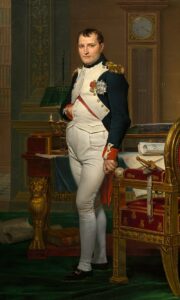
Napoleon Bonaparte - After Napoleon's exile to the island of Elba, Louis XVIII was restored to the French throne. British forces were deployed in England and Bordeaux during the last few months of the American War of 1812. The Carlist Wars and the eventual independence of Spanish America were both driven by a desire for greater autonomy and independence that arose from the experience of self-governance during the conflict.
- Portugal fared better than Spain towards the end of the war. There were no political revolutions, and the uprising did not spread to Brazil. Brazil's independence movement began in 1822, with the Portuguese Court relocating to Rio de Janeiro. Nevertheless, the Peninsular War, which was the deadliest event in Spain's modern history, had a lasting impact.
- The conflict highlighted the importance of the Spanish people and their ability to defend against foreign aggression. It also sparked a desire for greater political autonomy and independence, as well as a renewed sense of patriotism. These values played a crucial role in the development of modern Spain and its political system, which would continue to evolve in the centuries to come.
Image Sources
- https://en.wikipedia.org/wiki/Peninsular_War#/media/File:Battle_of_Somosierra_1808.PNG
- https://en.wikipedia.org/wiki/Battle_of_Talavera#/media/File:Le_3rd_Foot_Guards_%C3%A0_la_bataille_de_Talavera,_le_28_juillet_1809.jpg
- https://en.wikipedia.org/wiki/Napoleon#/media/File:Jacques-Louis_David_-_The_Emperor_Napoleon_in_His_Study_at_the_Tuileries_-_Google_Art_Project.jpg

